Thanks for joining us todaypublished at 22:53 BST 23 June 2023
We're closing this live page now but any major updates on this story will be marked by our news team overnight.
Thanks for joining us.
Canada's Transportation Safety Board says it is launching an investigation after the implosion of the Titan submersible left all five passengers dead
In the US, a separate probe will be launched involving the American counterpart and US Coast Guard
Tributes have been paid to Hamish Harding who would have turned 59 on Saturday, Shahzada Dawood, 48, and his son Suleman Dawood, 19, Paul-Henri Nargeolet, 77, and Stockton Rush, 61
Emails seen by the BBC show that concerns from an expert over the safety of the Titan sub were dismissed by OceanGate CEO Rush in 2018
Other industry experts have also raised questioned following the "catastrophic implosion"
But an OceanGate investor who has made the trip down to the Titanic told the BBC that the idea Rush had done anything wrong was "disingenuous"
It's emerged the US Navy originally detected “an acoustic anomaly consistent with an implosion” shortly after the Titan lost contact on Sunday
Brandon Livesay & Alex Binley
We're closing this live page now but any major updates on this story will be marked by our news team overnight.
Thanks for joining us.
Las Vegas businessman Jay Bloom has spoken to the BBC about his decision to not join the doomed Titan trip.
Bloom was intending to go, but at the last minute decided that he and his son would stay behind, opening up a spot for the Dawoods on the sub.
Text messages he shared show that OceanGate CEO Stockton Rush offered to discount his trip to $150,000 - down from the normal $250,000 per person.
But Bloom still refused, due to fears the sub was not capable of diving safely.
"Had we not had the safety concerns, it's something we really would like to have done," he told BBC News about a potential visit to the Titanic.
"But the more we learned, the more concerned we became."
Bloom called it a shame that Rush did not seek "constructive feedback" about the Titan.
He frequently touted the safety record of the industry, said Bloom, "but he completely disregarded his deviation from the industry norms".
Bloom described Rush as a "lone wolf without resources, who put things together with duct tape and WD40".
 Image source, Dawood Family/Lotus Eye Photography/Reuters
Image source, Dawood Family/Lotus Eye Photography/ReutersAs we've been reporting throughout the day, the families and friends of those lost on the Titan sub have been paying tribute to their loved ones.
Renowned French diver Paul-Henri Nargeolet was lauded as "one of the greatest deep-sea explorers in modern history" by his family. The 77-year-old was known as a world-leading Titanic expert who had completed more than 35 dives to the wreck.
The family of British billionaire explorer Hamish Harding described him as a "dedicated father" who "lived his life for his family, his business and for the next adventure".
"If we can take any small consolation from this tragedy, it's that we lost him doing what he loved," they said.
The Dawood family said they were "overwhelmed with the love and support it has received" after losing Shahzada Dawood, 48, and his son Suleman, 19.
OceanGate, whose chief executive Stockton Rush also perished on board its Titan sub, said it was a "tragic time".
You can read more about the five members aboard the submersible in this article.
 Chelsea Bailey
Chelsea Bailey
BBC News, St John's
St John's residents: 'These disasters affect us all'
Rescuers "fairly routinely" are sent out from St John's to help mariners, one residents tells me.
"We are surrounded by water," adds Captain Barry Rodgers.
"And the north Atlantic is not to be taken lightly."
You can see what else the locals had to say by clicking the play button on the video above.
An investigation into the Titan sub incident is set to be launched by the US National Transportation Safety Board (NTSB) and US Coast Guard, the NTSB has told the BBC.
The US Coast Guard is yet to independently confirm this.
The NTSB says roles, responsibilities and the scope of the probe are still being determined.
For now, this appears to be separate to the investigation announced by the Transportation Safety Board of Canada a few hours ago.
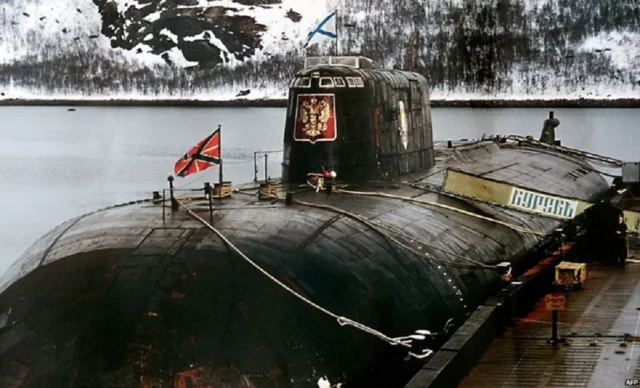 Image source, AFP
Image source, AFPRussia's Kursk submarine, which later sank, in an undated picture
We've taken a look back at some of the deadliest submarine disasters over the past 60 years:
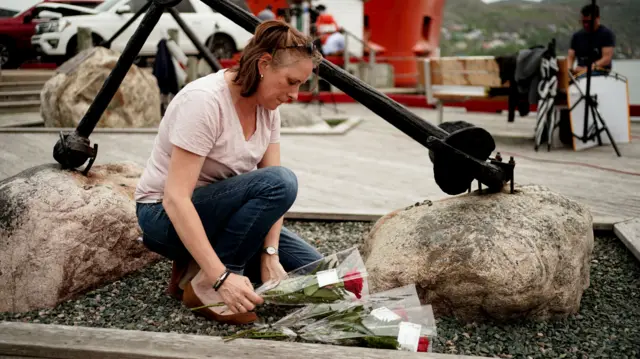 Image source, PA Media
Image source, PA MediaFive roses, one for each of the Titan sub victims, have been laid at the port of St John's, from where the crew set sail last week.
Hamish Harding, 58, Shahzada Dawood, 48, and his son Suleman Dawood, 19, Paul-Henri Nargeolet, 77, and Stockton Rush, 61, were killed in a "catastrophic implosion" of the vessel, it was announced on Thursday.
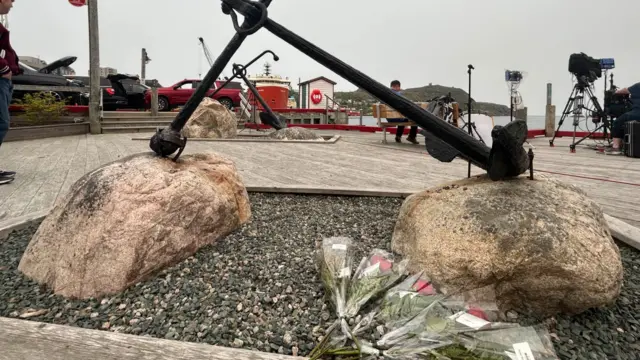
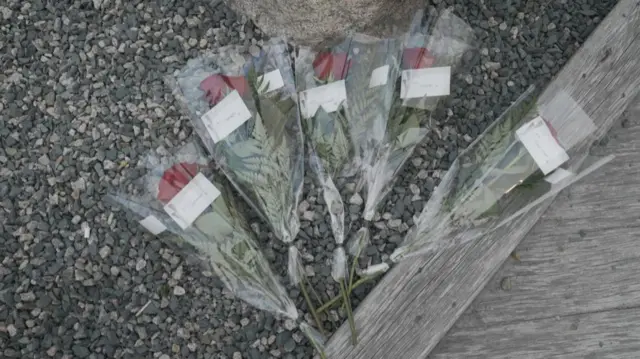
'Rush was doing something far beyond what anyone else had'
An investor in OceanGate, who made the same trip to the Titanic in August 2021, has come to the defence of CEO Stockton Rush, who was piloting the Titan when it imploded.
Aaron Newman told the BBC’s Michelle Fleury that the idea Rush had done anything wrong was "disingenuous".
"Stockton spoke to me for hours about ocean exploration," he said of his decision to invest in the company.
"His passion was amazing and I bought into it."
Newman credited Rush for "doing something far beyond what anybody else had" in creating a reusable sub, which he said was comfortable enough to carry several people and relied on an unconventional design.
"If the Wright brothers had crashed their plane, what would people be saying about them?" he asked.
It has been confirmed by Pelagic Research Services that a new mission to the Titan debris site is underway.
The company operates the Odysseus remote-operated vehicle (ROV), which discovered the debris and is the only ROV so far to visit the site.
It was launched from its ship, the Horison Arctic, at 16:30 BST this afternoon, with the mission to keep on mapping and documenting the area and helping in the recovery of debris.
The ROV took a little over an hour to travel to the debris site.
CNN reported a short time ago that the debris from the Titan sub is too heavy for Pelagic's ROV to lift, and recovery would need to take place at a later stage.
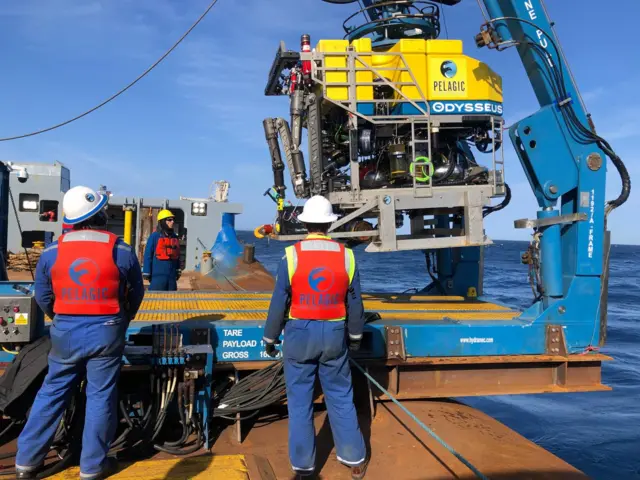 Image source, Pelagic Research Services
Image source, Pelagic Research Services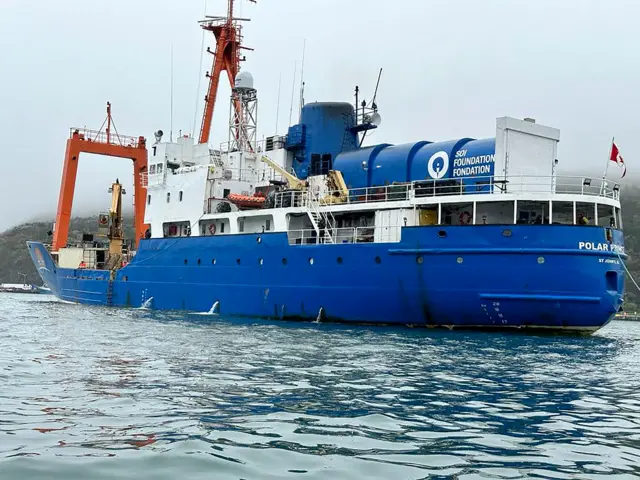 Image source, PA Media
Image source, PA MediaCanada's Transportation Safety Board (TSB) says it is launching an investigation into the implosion of the Titan submersible.
The five passengers aboard the vessel had begun their expedition to the Titanic wreck site aboard the Polar Prince, a Canadian cargo ship.
The ship, which had 17 crew members and 24 people were on board, was providing surface support to the Titan but lost contact an hour and 45 minutes after the submersible began its descent.
In a Friday statement, the TSB said it would conduct "a safety investigation regarding the circumstances" of the fatal operation.
A team of TSB investigators is now en route to St John’s, Newfoundland - from where the journey began - to "gather information, conduct interviews, and assess the occurrence", with other agencies on the ground also expected to be involved.
In the last few minutes John Kirby, National Security Council Coordinator for Strategic Communications, has spoken at the White House briefing room.
He was asked by a reporter about the sound of an implosion which the US Navy had detected.
"The navy did pass on to the incident commander the acoustic data that they had received," Kirby confirmed.
"They were also quick to make clear that they couldn’t be definitive about what that data meant. And they couldn’t be clear that that data was connected to the submersible."
He says the information was passed to the incident commander in charge of the search for Titan, and it likely "factored into the search plan in some way".
Asked if there were concerns that resources were wasted in the search, Kirby said "no", and that the coast guard has commented more fully on it.
 Jennifer McKiernan
Jennifer McKiernan
Live reporter
The OceanGate sub was operating in so-called international waters, also known as the high seas, which are areas outside territorial waters.
Territorial waters extend 12 nautical miles (22 km) from a nation's coast, and a further 200 nautical miles (370 km) offshore can be claimed as an 'exclusive economic zone', under the United Nations Law of the Sea Convention., external
Beyond that - and the Titanic wreck is about 350 nautical miles (648 km) off the coast of Newfoundland in Canada - vessels enter a limbo area where no state has full control.
Instead, individual ships are subject to the rules of the nation whose flag they're sailing under - and because submersibles are carried by another ship, they fall into a grey area where they can be effectively unregulated.
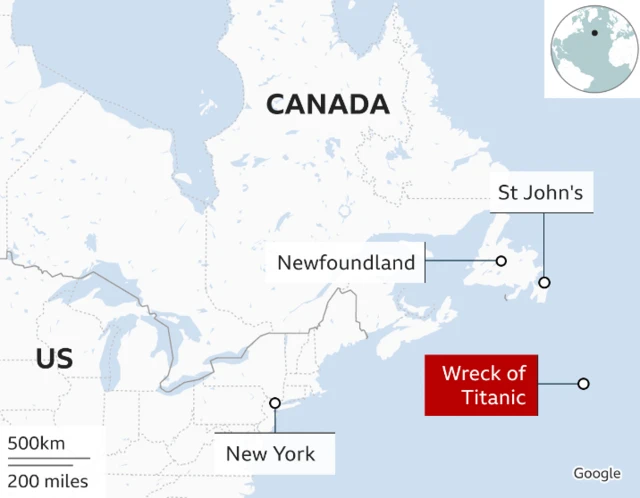
Five years ago, the Marine Technology Society, a group of 38 leading experts on submersible technology, voiced urgent fears about the safety of the Titan and US-based OceanGate's practices, specifically its voyages to the Titanic.
One signatory of that 2018 letter, Bart Kemper, highlighted how deploying the sub in international waters meant it avoided having to abide by US regulations, external, such as the US Passenger Vessel Safety Act.
The 1993 Act does regulate submersibles that carry passengers, requiring them to be registered with the Coast Guard.
But that law did not apply to the Titan because it did not fly a US flag, nor was it operating in US waters.
 Chelsea Bailey
Chelsea Bailey
Reporting from St John's, Newfoundland
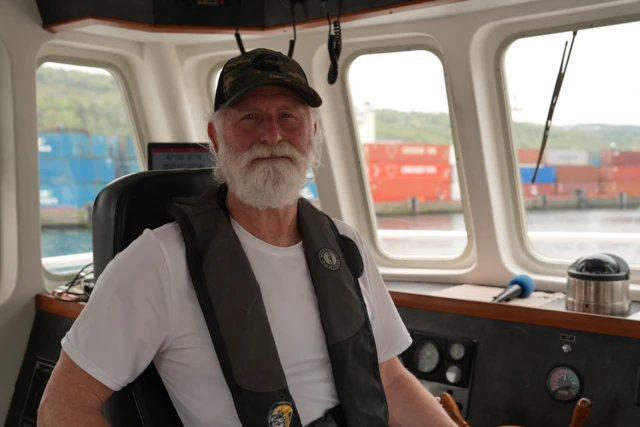
Captain Barry Rogers has been operating iceberg and whale tours from the coast of Newfoundland for more than 30 years.
A fifth-generation seaman, Rogers said his family - like many here in St John’s - has always made a living off the Atlantic.
He’s seen many things from the deck of his ship - the Capo de Espera, or Cape of Hope - but nothing like this week’s efforts to find the crew of the Titan.
“There’s a certain degree of grieving that we feel because we have a tremendous heritage here of sailing,” he said.
“We know more than most that tragedy can happen anytime, any place, to anyone.”
As his crew prepared the boat's second tour of the day, Rogers said he's keenly aware that the safety of his crew and passengers is paramount.
“It’s a huge responsibility,” he said. “There’s no room for a cavalier approach.”
A former employee of OceanGate, who previously warned of potential safety problems at the company which operated the Titan submersible, has given a statement.
David Lochridge, the company’s former Director of Marine Operations, had raised concerns as early as 2018.
He was involved in legal action after being fired by the firm. The case ended with an undisclosed settlement.
Lochridge did not comment on OceanGate or the 2018 lawsuit, but said he "was profoundly saddened to learn of the loss of the Titan and its crew".
“My deepest condolences go out to the families of those who perished in this tragedy. I cannot imagine your pain at this time," he continued.
“I also extend my gratitude to the rescue services, military personnel, and everyone else involved who worked relentlessly under challenging conditions to bring the Titan crew home.
"Their tireless efforts underscore the critical network in place to support our subsea community.”
 Eloise Alanna
Eloise Alanna
Reporting from St John's, Newfoundland
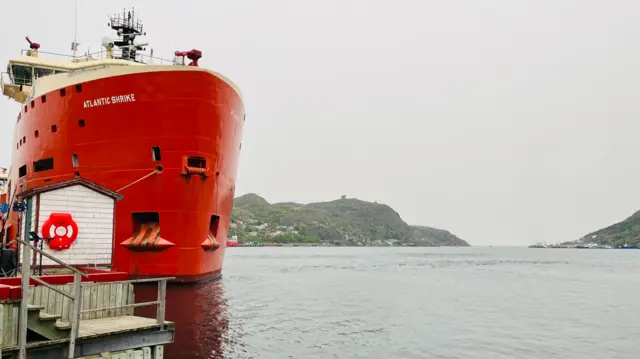
About a dozen ships were deployed to help the rescue mission
This is the scene today at St John's, from where the Polar Prince originally set sail as it towed the Titan submersible behind it.
It had become a hive of activity as the search for the sub was carried out.
Today, there are a few tourists and locals who have come down to have a look at harbour side park - but only a handful.
Why did the Titan implode?
The pattern of the debris suggests that at some point in the Titan's journey there was a leak. The amount of water above it would have been equivalent to the weight of the Eiffel Tower.
Was there an early warning system?
On its website, OceanGate also says the vessel's hull was fitted with ''a real-time hull health monitoring system''.
Had it operated as it should have, the tragedy would likely have been averted.
If the cause of the accident was a hull breach, investigators will want to find out why it failed.
How will the investigation be carried out?
Investigators will be gathering every piece of the debris they can find, according to Ryan Ramsey, former submarine captain in Britain's Royal Navy.
It is unclear at this stage which agency will lead the investigation, but as the US Coast Guard has played a leading role in the operation so far, it is likely to continue to play an important part.
 Image source, Reuters
Image source, ReutersWe've been hearing from deep sea exploration experts throughout the day who have criticised OceanGate over the safety of the Titan sub.
The BBC has seen messages which show warnings over the sub's safety were repeatedly dismissed by CEO Stockton Rush - one of the five men who died onboard the craft.
Rob McCallum, a leading expert in the field, told Rush he was potentially putting his clients at risk and urged him to stop using the sub until it had been classified by an independent body.
Rush responded that he was "tired of industry players who try to use a safety argument to stop innovation".
The tense exchange ended after OceanGate's lawyers threatened legal action, McCallum said.
"I think you are potentially placing yourself and your clients in a dangerous dynamic," he wrote to the OceanGate boss in March 2018.
"In your race to [the] Titanic you are mirroring that famous catch cry: 'She is unsinkable'."
In the messages, Rush expresses frustration with the criticism of Titan's safety measures, writing in one email: "We have heard the baseless cries of 'you are going to kill someone' way too often. I take this as a serious personal insult."
OceanGate has not commented on the email exchange.
You can read more on this story here.
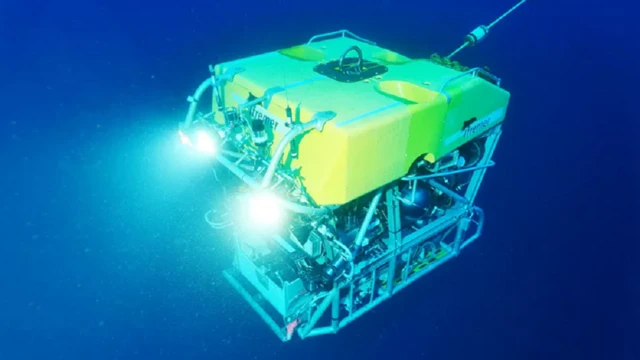
Remotely operated vehicles will be collecting the debris
Any investigation into the Titan sub will undoubtedly focus on trying to work out what exactly happened to it - but how will experts do this?
One of the things they will be looking to do is examine the debris.
In particular, they will be looking for the site of the rupture - which will be hard because the Titan's body is in small pieces, and harder still because it is being collected by remotely operated vehicles (ROVs) in the darkness of the deep sea.
Another focus of the investigation will be whether there were sufficient checks following each dive. Each time the Titan went down on a deep dive, its hull would have been compressed by the immense water pressure - it would have become smaller and then returned to its normal size on its return to the surface.
This regular stress would have led to fatigue of the material, weakening it. It is so far unclear whether there were checks for cracks after each dive and if so how extensive they were.
You can read more on what experts will be looking for here.
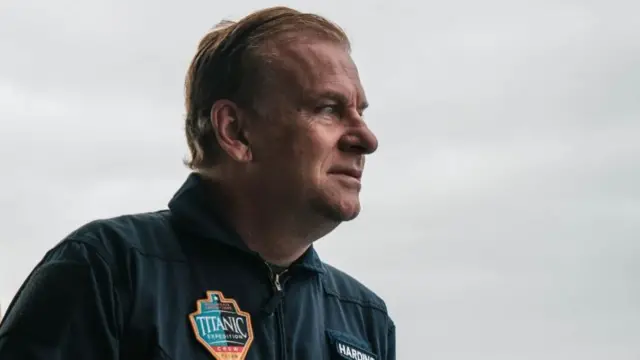 Image source, Dirty Dozen Productions
Image source, Dirty Dozen ProductionsHamish Harding
The cousin and goddaughter of Hamish Harding has called for a full investigation into the deaths of the five Titan passengers.
In an interview with BBC special correspondent Lucy Manning, Lucy Cosnett asked what safety checks had been in place before the tragedy.
"It should be fully investigated, to see what went wrong, why it happened, why they didn’t survive," Cosnett said.
"He [Harding] was going to have his birthday tomorrow. He’d be 59 years old. I would have sent him a message or tried to call him to wish him happy birthday.”
Reflecting on the last few days, Cosnett said: "When I read they had heard banging noises I was feeling hopeful that maybe it was coming from the submersible.
"But then yesterday was the worst when I heard that he didn’t make it, that they all died," she said.